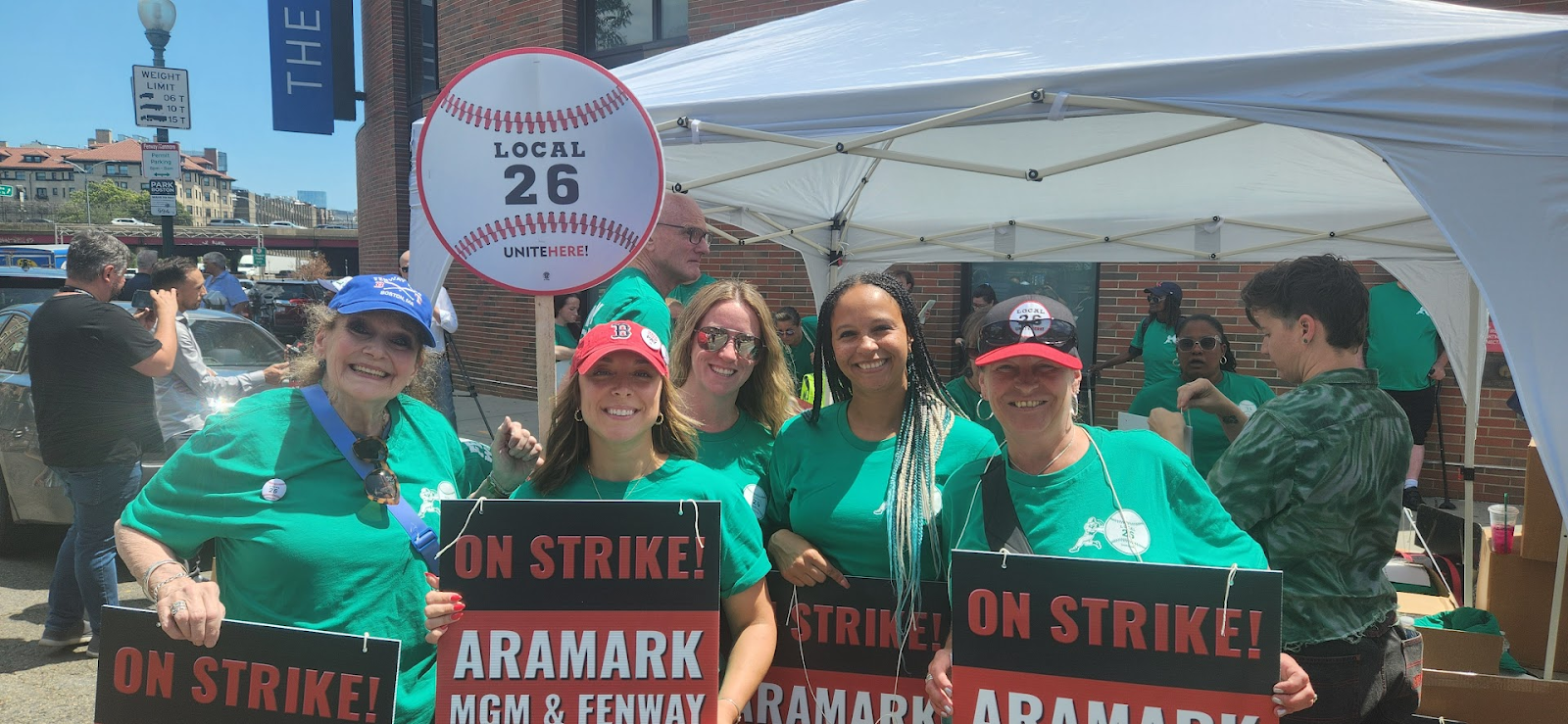[[{“value”:”UNITE HERE Local 26 concessions workers on strike. (Working Mass)
FENWAY PARK, MA – For the first time in over a century, America’s Favorite Ballpark’s concessions workers are on strike.
UNITE HERE Local 26 gave Aramark a 48-hour deadline on Wednesday, July 23, to meet worker demands before one-thousand workers walked out of Fenway Park and MGM Music Hall. After a month of negotiations with management’s feet to the fire of the strike threat, Fenway’s concession company Aramark has still not come close to meeting the demands of their workers for adequate wages and against automation.
Aramark Strikes Out
The main fight for Fenway workers is over wages, especially for non-tipped workers. President Aramayo noted in June that Fenway workers are “paid peanuts” compared to their counterparts in other stadiums. Even in the city of Boston, workers in concession services at Boston University and Simmons University are paid $26-$28 an hour. Fenway workers are paid $18-$20 an hour at the highest level of seniority.
Non-tipped workers are essential to making Fenway’s and MGM’s concessions work function. Charbel Salameh, a beer seller for 28 years and counting, told the press on Wednesday:
There are a lot of hourly folks who don’t earn gratuities here, like cooks and warehouse workers that nobody really sees. If the warehouse workers don’t deliver the product, there is no product.
There’s also the struggle against automation. Since the COVID-19 pandemic, sports and music venues have begun to introduce more computer systems and mechanisms in concessions areas. Aramark has introduced more computerized cash registers in the years since COVID-19 at Fenway, too. The surge in automation has heavily impacted the Fenway workforce and their service without much of a wage increase.
Salameh described a workforce that Aramark has hollowed out through automation:
It used to be that there were four beer sellers per stand. Now, we have one person overseeing four registers.
The more time is spent working at Fenway, the more likely one is to get a higher-earning shift. But with the introduction of automation and the decreasing numbers of shiftable staff, employees who have been working at Fenway for even fifteen years are much less likely to get picked up for a shift.
For employees like Amanda Savage, who have been working at Fenway for eighteen years, earnings have fallen dramatically. The money she’s able to bring in is far lower than before there were computers replacing her coworkers. Savage is on track to receive half the earnings from gratuities last year, half of what she had earned the year before, even as the price of everything goes up.
UNITE HERE Local 26 announcing concessions workers would strike in 48 hours – on Wednesday, July 23. (Working Mass)
The introduction of automation has likewise hindered workers from making personal connections.
For Savage, one of the best parts of working at the park used to be serving little kids with ice cream. The installation of computer systems has stolen the joy and alienated her more. The computer systems that prevent customer-to-worker interaction have decreased the number and quality of interactions shared between fan and concessions workers; in fact, Aramark has discouraged workers from maintaining that connection altogether. Savage reported that Aramark once warned her not to be so close to the concessions stand as customers were checking out.
Gratuities that workers once enjoyed have decimated exponentially. Heidi Kertatos, who has worked at Fenway for nineteen years, had put her time year after year to work herself up the ladder as a beer seller. After COVID-19, though, she immediately noticed differences:
Once COVID came, Aramark changed things. They took away cash, so now, you have to split a thousand dollars between six people for working four registers.
Like many companies, Aramark used a global pandemic to underpay workers more.
Fenway Workers Take a Walk
Many workers still held hope Aramark would meet their demands in the eleventh hour.
Lauren Casello, a suite attendant, has worked Fenway for twenty-two seasons. She shared her concern “I’m nervous. This is my full-time job. I need to work, so we’re hoping that Aramark comes to us with something good.” But they have no choice – as Salameh stated during Local 26’s press conference: “none of us want to walk out, but all of us want to make a living wage.”
After his last meeting at the negotiating table, Salameh’s last glimmer of hope was dashed:
Right now, it feels like we’re treated like cattle. We have all put in a lot of time, and everybody used to know our names. Now, they don’t wanna know who you are.
For most workers, it was the final straw.
At noon on Friday, July 25, Fenway Park workers went on strike. Their black-and-red signs sprung up around the Fenway area with rapid succession, alerting every passersby to the strike, and workers took to the picket line with bravado and strike signs firmly in hand. Within an hour they were joined first by dozens, then hundreds, from organizations including other unions and the Boston Democratic Socialists of America. Around 3PM, Boston City Council member Julia Mejia also joined the picket line.
Even more community organizations made plans to join the picket line on the weekend as the Boston Red Sox face the Los Angeles Dodgers.
Union workers are asking fans to attend games but to not buy beer, food, or other concession items if workers go on strike. They need Aramrak to feel the pain in the absence of concessions workers on the company. Supporters can join workers on the picket line at Fenway Park.
Nineteen-year old beer seller Laura Crystal put it simply:
It’s the epitome of corporate greed. We need to squash it.
Andrew S is a community organizer with Boston DSA and contributing writer to Working Mass.
The post In 113-Year First, Fenway Park Concessions Workers Go On Strike appeared first on Working Mass.
“}]]

